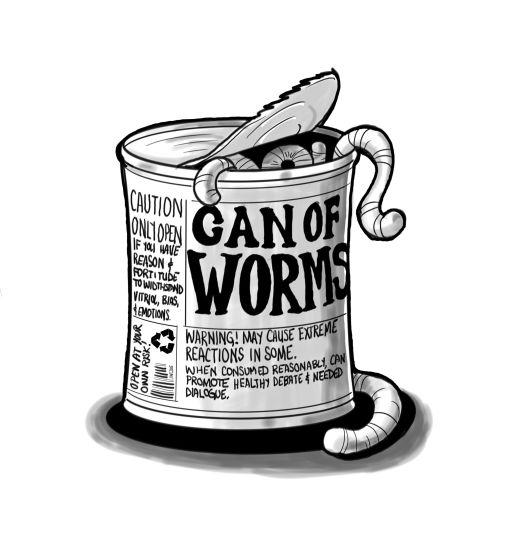(单词翻译:单击)
听力文本
Hello and welcome to the VOA Learning English program, "Words and Their Stories."
They slither. They are slimy. For most people, they are high on the list of animals nobody loves.
They are worms and snakes. From ancient folk stories to modern animated films, snakes and worms do not often play the hero. Fair or not, they are usually the characters that set bad examples.
This is also true in American English. In our idioms and expressions worms and snakes are often the bad guys.
First, let's talk about worms.
If you don't like worms, one is bad enough. But a whole can of worms is really bad! A can of worms is a very difficult issue or set of problems. And to open a can of worms means to share those problems with other people who may not want to know about them.
Now, worms are good at slowly digging themselves into the ground. And when they are in the ground they are difficult to catch. This is the root of two common expressions.
If you worm your way into something, you get something you want by slowly using tricks and lies. For example, "I can't believe he wormed his way back into her life! She won't ever learn!" And if you worm your way out of something, you are avoiding or escaping something by using again tricks or lies.
But not all worm expressions are bad. A common expression, the early bird get the worm means the person who gets up early is in a better position or gets the worm. Good for the bird. Bad for the worm.

Now, let's talk about snakes.
When snakes move, they slither along the ground or in the grass. It seems as if they do not want to be seen. So, a snake in the grass is a sneaky person who cannot be trusted.
Here's how you can use it in a sentence: "Be careful around her. She is just a snake in the grass."
Another reason many people fear snakes is because they bite. And who wants to get bit by a snake, right? So, snakebit means to be very unlucky. For example, if your favorite soccer team is snakebit, they are losing every game.
Even if many people do not like them, snakes are useful. Their beautiful skins are used for boots and bags. But have you ever used snake oil? It is probably better if you haven't.
In American English, snake oil is a method or treatment that does not work. It's a trick.
Some word historians say this expression comes from Asian-American workers in the 1800s who brought real snake oil over with them. Some believed the oil from a certain type of snake could help joint and muscle pain. But then people started making fake snake oil that did not do anything. So, a snake oil salesman is a fake, an imposter, a charlatan. They are not to be trusted.
Maybe that's why the snake oil business has never really recovered.
Beside the creepy way they move, snakes and worms have something else in common. In American English, calling someone a snake or a worm means that person is not liked or respected.
And that's it for today's program.
I leave you with one more worm expression. There is an informal and rather dark way to refer to a dead body -- food for worms or simply worm food. In fact, there is even a dark children's nursery song about worms coming to eat a dead body buried in the ground.
Like I said early in the program, snakes and worms are creepy. I'm Anna Matteo.
重点解析
1.a can of worms 棘手的事情
A lot of us knew this would be a can of worms.
我们大部分人都知道这将是一件棘手的事情。
2.open a can of worms 自找麻烦
Boy, this time you sure did open a can of worms.
好家伙,这次你确实自找麻烦了。
3.worm one's way into 通过诡计以及谎言慢慢得到...
Before Libyans rose up against him, Muammar Gaddafi used money, and well-timed diplomatic overtures, to worm his way into the West's good graces.
在利比亚人揭竿而起之前,穆阿迈尔·卡扎菲用金钱和见缝插针的外交逢迎,缓缓地获得西方的青睐。
4.snake in the grass 狡猾的家伙
That snake in the grass cheated me of my money.
那个狡猾的家伙骗了我的钱。
参考译文
大家好,欢迎来到VOA学英语《词汇掌故》节目。
它们蜿蜒爬行。它们浑身黏滑。对大部分人来说,它们都名列人们不喜欢的动物的前列。
它们就是蠕虫和蛇。从古代民间故事到现代的动画片,蛇和蠕虫通常都不是英雄的形象。不管公平与否,它们树立的通常是反面的榜样。
这点在美式英语中也一样。在我们的习惯用语和表达中,蠕虫和蛇通常也是坏家伙。
首先,我们来说一下蠕虫。
如果你不喜欢蠕虫的话,那么看到一只就够糟了。但是一整罐子蠕虫更糟糕!A can of worms是指非常困难的问题或者一系列问题。To open a can of worms指的是与那些并不想了解问题的人们分享问题。
现在,蠕虫非常擅长钻入地下。当它们藏入地下后,便很难捉到它们。这便是两个常用表达的来源。
Worm your way into something意思为通过诡计以及谎言慢慢得到某物。比如,我不敢相信他竟然又重新回到了她的生活!她永远也不会知道。Worm your way out of something指的是用诡计或者谎言避免或者逃避某事。
但与worm相关的表达并非全是不好的。常见表达the early bird get the worm的含义是早起的鸟儿有虫吃。对鸟来说是好事,对虫子来说则不然。
现在我们来说说蛇。
当蛇移动时,它们会在地上或者草丛中蜿蜒前行。似乎,蛇并不想被别人看到。因此snake in the grass是指无人信任的狡猾人物。
可以在一个句子中这样使用:跟她一起时小心一点,她非常狡猾。
人们害怕蛇的另一个原因是蛇咬人。谁想被蛇咬到呢,对不对?因此snakebit的意思就是不幸。比如,如果你最爱的足球队是snakebit,意思就是该球队每赛必输。
尽管很多人都不喜欢蛇,但是蛇还是很有用途的。其漂亮的皮肤可用于制作靴子和包包。你是否用过蛇油呢?如果没有用过,那就再好不过了。
在美式英语中,snake oil是指不起作用的方法或者疗法。也就是指花招。
一些历史学家表示,该表达来源于19世纪亚洲裔美国人,这些人带来了真正的蛇油。一些人认为某种蛇类的蛇油能够帮助治疗关节和肌肉疼痛。后来,人们就开始制造没有任何作用的蛇油。因此snake oil salesman是指赝品商人、骗子以及江湖医生。他们得不到人们的信任。
或许这也是蛇油生意不再真正复苏的原因。
除了令人毛骨悚然的爬行方式,蛇以及蠕虫还有其他共同点。在美式英语中,若称某人是snake或者worm,那就表示大家不喜欢或者不尊敬这个人。
以上便是今天节目的内容。
我还给你们剩下了一个关于worm的表达。有一种非正式的、非常黑暗的用来描述尸体的说法--food for worms或是simply worm food。实际上,甚至还有一首相当黑暗的儿歌。这首儿歌是关于蠕虫来吃埋在地下的尸体的。
就像我在节目中前面内容说到的,蛇和蠕虫都令人毛骨悚然。我是安娜·马特奥。


